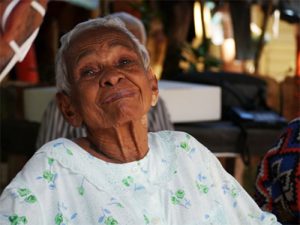1. If Your Goal Is Becoming a Centenarian Dodge Chronic Diseases

Doña Natividad Martínez de la Cruz, 121 years old
Image copyright 2021 dominicantoday.com Included under the provisions of fair use under U.S. copyright law.
How do you become a centenarian? If you google this question you will get a wild mix of influencer blogs, media articles, book recommendations and scientific sources. You will also get plenty of to do lists: A long list of weird and wonderful health secrets from around the world. Secrets of becoming a centenarian. 9 Lessons From The People Who’ve Lived The Longest.
The items that come up repeatedly are:
- Eat until your stomach is 80% full
- Eat plant food
- Drink one or two glasses of wine each day
- Be active
- Have some downtime
- Have a purpose in life and feel a sense of belonging
- Be connected to family and friends.
Some influencers are clearly micro-managers with lengthy lists:
- Take brewers yeast for nutrition.
- Wash hands and close the toilet lid before flushing to stop the spread of germs
- Own a dog or a cat
- Do your own housework
- Take a fish oil supplement for brain function.
- Take drinkable gold for your immune system
- Use leeches for osteoarthritis and other diseases
- Fast regularly
- Drink chicken soup because it has special healing power. Include: Curry, pepper, garlic, onions, carrots, turnips, celery, parsley, dill, parsnips, rutabaga, bell peppers, rosemary, thyme, and bay leaves.
- Manage your salt intake
- Clean your showerhead
- Take cold showers
- Have a weekly Sauna ceremony.
- Detoxify
- Eat dirt
- Eat Garlic
- Sanitize. Avoid germs, pathogens and viruses
- Eat food that’s piping hot
- Strengthen your DNA by taking special supplements
- Use herbal teas and supplements
- Eat majority vegetarian (90/10)
- Strength train
- Sit less. Stand if sitting for 45 minutes or more.
- Nap
- Balance your PH levels via diet
- Practice gratitude and engineer happiness
- Spend time outdoors
- Run
- Hold a life philosophy
- Become a life long learner
- Use a holistic doctor
- Practice special deep breathing methods or yoga
- Don’t sleep next to your cell phone, limit blue light and detox digitally
- Find an incredible mentor such as a relationship coach, life coach, career coach, or therapist
- Hugs
- Practice sleep hygiene
Ridiculous list items aside, centenarians and super-centenarians became a subject of research during the last decades. The reason for this new scientific interest is the simple fact that more people reach old age. According to the 2010 census 51 000 Americans were 100 years old or older. In 2016 this number raised to 82 000 and the number for 2020 is projected to be 92 000.
This raises the question why some individuals reach their 100s while others die early. Can we learn from those centenarians by studying their habits, genetics and physiology and in the process help everybody else extend their life maximally? With high quality of life?
So far data collected suggest that centenarians have one thing in common. They delay or escape vascular disease even toward the end of their exceptionally long lives. Even more importantly, a surprising proportion of these individuals tends to be still functionally independent or require minimal assistance.
This means that the key to a healthy, long life is dodging chronic diseases or at least delaying them as long as possible. In the past it was thought that the prevention of chronic diseases would start in middle age, but recently the understanding of health and longevity has changed profoundly. Negative lifestyle choices during all life stages, especially the so-called critical periods, prime the individual for the development of chronic diseases.
This generates a follow-up question: What would a lifestyle during childhood, adolescence and adulthood need to look like that would delay those chronic diseases as long as genetically possible?
Before we explore each life stage, it is important to review and expand your knowledge about vascular disease and contributing factors. Understanding how vascular disease develops will allow you to understand the connection between lifestyle decisions in various life stages and longevity.
At the end of the module we will take an excursion into recommended eating patterns and some of the currently popular diets. This knowledge will enable you to evaluate which of those diets and eating patterns are appropriate during all life stages.
After studying the first module you will be able to:
- Explain the physiological changes that take place when a person becomes overweight or obese.
- Connect the physiological changes triggered by obesity to type 2 diabetes, hypertension and cardiovascular disease
- Understand how type 2 diabetes, hypertension and cardiovascular disease develop
- Describe lifestyle choice to reduce the risk for chronic diseases
Want to Know More?
Schoenhofen EA, Wyszynski DF, Andersen S, et al. Characteristics of 32 supercentenarians. J Am Geriatr Soc. 2006;54(8):1237-1240. doi:10.1111/j.1532-5415.2006.00826.x
Jean-Marie Robine, Sarah Cubaynes, Worldwide demography of centenarians, Mechanisms of Ageing and Development, Volume 165, Part B, 2017, Pages 59-67, ISSN 0047-6374, https://doi.org/10.1016/j.mad.2017.03.004.
Over 100 years old
Over 110 years old


Feedback/Errata